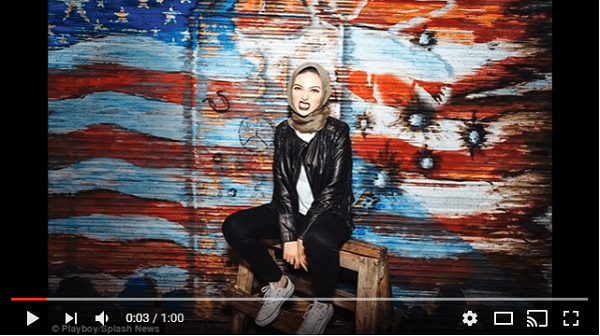
The Muslim community’s response to Noor Tagouri’s appearance in Playboy has been generally been one of condemnation or support. Despite the opposition of their differing opinions, the one thing they both share is that their responses are reactionary. Both fixate on the small picture of Noor’s actions (should she have done this?), rather than the larger picture — how does this event play into the greater context of the Muslim American experience, namely the challenge of assimilation amidst increasing anti-Muslim sentiment.
Within this context, it isn’t hard to see how Playboy’s release of Tagouri in front of the American flag in their October “Renegades” issue perpetuates the classic tale of Muslim assimilation in America and in general, the West.
Tagouri’s dream to become the first hijabi Muslim anchorwoman, i.e. while wearing a religious garment that represents modesty and dignity, was surreptitiously turned against her. Instead of broadcasting her as an aspiring anchorwoman that can handle the job well while faithfully adhering to principles of modesty, the magazine photos features her in a pose that plays into colonial fantasies of the Muslim woman and the fetishization of their veils: A suggestive tug of her black leather jacket and a feisty kitten growl are deliberate suggestive provocations by Playboy.
By no means do I implicate Tagouri in consenting to this projection. The actor rarely knows of the subtle maneuvering conducted by the directors. However, the end result is a characterization of hijab as sexy as opposed to its original meaning as modest. And, it’s not just photos. There is an entire package around the interview, including a vlog and promotions via Snapchat.
In the backdrop of 9/11, anti-sharia laws, hijab bans and Trump, there is an increasing pressure for Muslims to assimilate in the West. It is no coincidence then that Tagouri strikes her pose in a U.S.A. shirt in front of an American flag with a peace symbol. The message is clear. This is what the peaceful assimilated American Muslim woman looks like. The harmless Muslim. The Muslim who will not threaten our culture, who will not challenge us.
It is not the scary niqabis nor the bearded men. Nor is it the one with the too-long clothes. If banning won’t bar us from our hijabs, then let’s remove the power from hijab by corrupting it from the inside out. In other words, if Islamic practices want the approval of the American public, they have to show how they too can be vehicles for hedonism and convey none of those threatening Islamic values. Consider that Muslim women have always been prime targets for anti-Islamic politics because their power to pass their values on to their children ensures the continuation of their culture and traditions.
A number of Muslims support Tagouri, thinking her actions defy stereotypes of how a hijabi Muslim should behave and thus breaks the Muslim monolithic identity that one of us is all of us. However, when we shift from focusing on her individual actions to focusing on the greater agenda, we’ll realize that we’re not breaking stereotypes by perpetrating stereotypical Oriental myths about Muslim women.
We’ll also realize that we don’t have the freedom of acting on our individual aspirations if that means being caught in the snare of a racist agenda.
The Muslim community’s response to this incident is indicative of the absence of a well-developed Muslim collective vision and agenda for social engagement and politics, which then makes us reactive as opposed to visionary. It is others who feed us the crumbs; we simply decide whether to grab them or not. Rather than focusing on the crumbs, we should be focusing on the cookie. In this way we won’t constantly have to cede our power to the agendas of those who do not have our best wishes at heart.
Many Muslims are using secular progressive paradigms to maneuver their space in American society, but unless these are firmly rooted in Islamic morals, we will lack meaningful guidance towards a truly authentic and empowered Muslim American identity. Maybe Tagouri is rooted (as much as you can be at that young age). Her open letter seems to convey that. But how much was truly about empowerment and how much was about assimilation at the cost of our identity?












